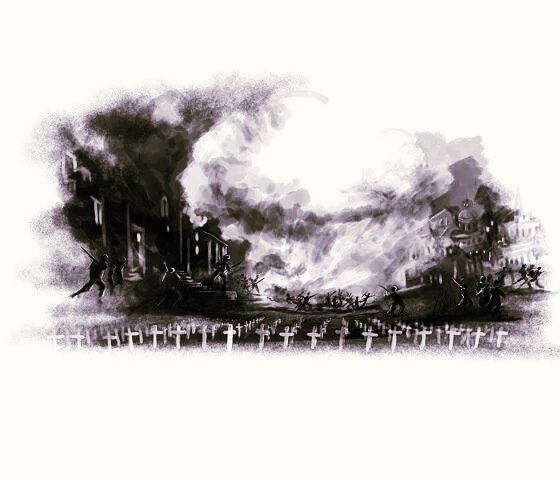
Poppies by Jane Weir is a take on the conception and event of wars from a mother’s perspective who is trapped in a web of emotions concerning her soldier son. The dilemma that engulfs her is exhibited by Weir through extensive figurative language that puts politics with emotions i.e. war-led deaths and maternal life force on the same plain.
Jane Weir is an Anglo-Italian writer who composed “Poppies” in 2005 but later got published in an edition of The Guardian in 2009 revolving around war poetry.
Poppies | Summary and Analysis
The poet creates a first-person speaker to convey the apprehensions of a mother in a conversation-seeming format where she is the only one speaking. Her counterpart i.e. her son is a silent listener as he is no more. She is recalling their past in all bitter-sweet moments which now appear too distant. The only solace a soldier’s mother relies on after his stationing in a war camp is the memories of her child. Fighting a battle renders army men bravery and accolades for their courage but their physical strength is juxtaposed with the emotional resistance of their families, especially their mother’s display which is too similar to a war they fight with themselves. A war of conflicted opinions tears down a mother and compels her to choose between her love for her son or her duty toward the nation.
Poppies by Jane Weir | Structure, Language and Themes
The poem is divided into four stanzas with the first and the last stanza consisting of an equal number of lines, thus giving it a cyclic structure. The absence of any rhyme and metre is a reflection of a mother’s continuous flow of thoughts pouring down from a nostalgic trip and naturally steeping into emotions and pain. There is an ambiguity in the time frame of the poem as the poet opts to not specify whether the mother has lost her son already or is experiencing grief while sending him away for the war.
The title ‘poppies’ signifies the flowers, especially the red ones that grew on the war grounds as a symbol of death and thus acts as a remembrance to all the people who gave up their lives. Memory, the Mother-Son relationship and A soldier’s life and duty comprising of uncertainty and death are some of the major preoccupations of the poet. The personal aftermath of a war is narrated from a point of view of a mother rather than any details of bloodshed, conquest or politics.
Poppies | Summary and Analysis, Lines 1-6
Three days before Armistice Sunday
and poppies had already been placed
on individual war graves. Before you left,
I pinned one onto your lapel, crimped petals,
spasms of paper red, disrupting a blockade
of yellow bias binding around your blazer.
The poem commences with the mother persona remembering the Armistice and the days before it when the graves of soldiers begin to witness showers of poppies to commemorate their sacrifice. The historical reference to the Armistice- a day celebrated every year to mark the first step towards the end of the First World War in 1918, in the contemporary war scenario of the British in Iraq and Afghanistan lends the nature of war a universal edge in its ultimate end- death and destruction.
She then introduces the second person “you” after recalling pinning one of the red poppies on her son’s coat right before his body goes away for the last rites, whose petals are “crimped” signifying the amputations and injuries of the soldiers during a war. The phrase “spasms of paper red” also evokes an image of a gunshot wound like a red blot on his body tearing apart his muscles and leaving him in pain. The redness of the flower creates a contrast to the yellow flowers covering the entire blazer which creates a “blockade”- a military scenario. There is a representation of two spheres here- the domestic which is the mother’s domain through the textile imagery of the blazer and the war ground of the son through the “blockade” and his uniform.
The detailed imagery of the flower advocates the clarity of her memories and the fondness with which she still harbours them. She attempts to place herself and her emotions apart from the rest of the people who pay their respects to him expressed in the alliteration “bias binding.”
To interpret the stanza in a context where the son is still alive leaving for a battle and the mother preparing his uniform, then the metaphors and imagery foreshadow his impending death.
Poppies | Summary and Analysis, Lines 7-17
Sellotape bandaged around my hand,
I rounded up as many white cat hairs
as I could, smoothed down your shirt’s
upturned collar, steeled the softening
of my face. I wanted to graze my nose
across the tip of your nose, play at
being Eskimos like we did when
you were little. I resisted the impulse
to run my fingers through the gelled
blackthorns of your hair. All my words
flattened, rolled, turned into felt,
The mother is still looking at her dead son and revisits the past when one of her key occupations involved clearing away the cat’s hair from her son’s coat through sellotape. She wears the tape as a “bandage” during her visit to her son’s body for the last time as a measure to heal her emotional wounds. She knows that this time her son’s coat does not require the sellotape trick to keep the cat hair away. The mental toll it takes for a mother to prepare herself when looking at her dead son is unimaginable. It transports her to a world of desires like touching him and playing with him. But she practices resistance and the use of cloth metaphor “felt” for her words, grief and emotions as something wrapped up neatly into it voices the poet’s art to infuse poetry with her skills of designing. Also, the “gelled blackthorns” of the son’s hair are a mythological reference to the plant which is known for its sinister reputation and association with darkness, death and war.
If the son is alive in the alternate context, then the mother’s preparation for her son’s departure continues from the previous stanza. The “sellotape” and “bandage” juxtapose a day-to-day use object with an image of a wound which keeps the mother occupied in her worry for her son. The steeling of softness on her face caters to her attempt to not cry and be mentally assured that her son shall come back alive. She does not want her son to bear witness to her agony and dilemma which is a demotivating force for any soldier.
Poppies | Summary and Analysis, Lines 18-29
slowly melting. I was brave, as I walked
with you, to the front door, threw
it open, the world overflowing
like a treasure chest. A split second
and you were away, intoxicated.
After you’d gone I went into your bedroom,
released a song bird from its cage.
Later a single dove flew from the pear tree,
and this is where it has led me,
skirting the church yard walls, my stomach busy
making tucks, darts, pleats, hat-less, without
a winter coat or reinforcements of scarf, gloves.
The enjambment justifies the conflict a mother experiences between her wishes and actions which continue to run inside her but choose to melt away instead of realising. A mother’s bravery to requires recognition as she moves with her son on his last journey where the entire world awaits him “like a treasure chest.” The simile refers to his coffin which resides in his last remains and the son like every soldier is a treasure to his nation. The alliteration “split second” communicates the fast pace of time which separates the mother from her son. She enters her son’s bedroom and sets a songbird free from its cage which is similar to her son’s freedom leading him to another world. However, a dove (symbol of peace, innocence and purity) flies from a pear tree which the mother hurriedly follows to the church due to her loss of control of her body movements in the grappling grief. She assumes it to be her son’s soul guiding him and she moves out of her house without any winter-proof clothing.
Another elucidation of these lines suggests the mother walking with her son to the gate of her house to bid him adieu to a world full of dangers as well as possibilities he is excited to embark upon a journey. The intoxicating effect of the independence and freedom he achieves after stepping out of his house into a world of responsibilities enamours him. The mother revisits her son’s bedroom in order to feel his presence. Her stepping out of the house wearing winter inappropriate clothing situates her unpreparedness for her and other soldiers’ lack of safety from their rivals. Interestingly, winter is a symbol of death and the poet amalgamates all the signs to point toward her son’s approaching death.
Poppies | Summary and Analysis, Lines 30-35
On reaching the top of the hill I traced
the inscriptions on the war memorial,
leaned against it like a wishbone.
The dove pulled freely against the sky,
an ornamental stitch, I listened, hoping to hear
your playground voice catching on the wind.
She continues her journey and reaches the war memorial and she leans against its inscriptions “like a wishbone” (simile) as if unable to support her body anymore and make a wish for her son’s return. The dove is flying free in the sky which appears to be “an ornamental stitch” which is again a cloth metaphor for the dove in the sky. The poem concludes with the mother hoping to listen to her son’s voice from his childhood once again.

